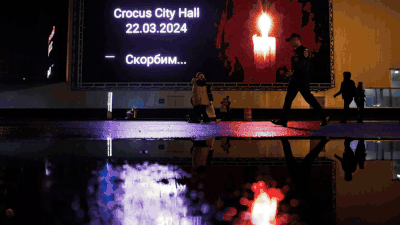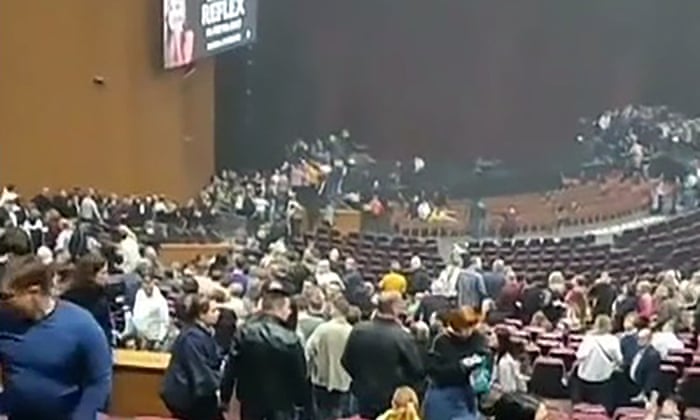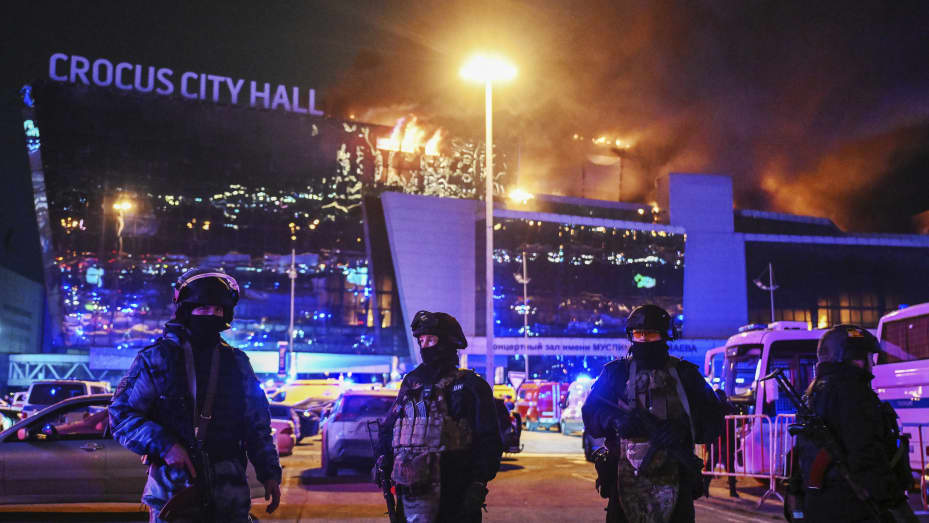Tragedy Strikes Moscow, 40 Killed And Dozens Injured In Concert Hall Shooting, ISIS Claims Responsibility For The Carnage
Akin to what happened in Israel, a large concert hall on the outskirts of Moscow became the scene of a harrowing attack on Friday. Multiple assailants stormed the venue, unleashing automatic gunfire into the crowd, resulting in numerous casualties and igniting a fire that engulfed the building. The brazen assault has transpired just days after President Vladimir Putin secured a resounding victory. The terrorist organization commonly known as ISIS, or the Islamic State group, has claimed responsibility and has been designated as such by numerous countries and international organizations due to its involvement in numerous acts of terrorism worldwide.

Several gunmen stormed into a sprawling concert hall on the outskirts of Moscow on Friday, unleashing automatic gunfire into the crowd, resulting in the deaths of at least 40 individuals and leaving over 100 others wounded.
The assailants also ignited a fire within the venue, marking a brazen assault occurring shortly after President Vladimir Putin’s recent consolidation of power through what is being labelled as a “heavily orchestrated electoral victory”.
Moscow’s Mayor Sergei Sobyanin labelled the incident a “massive tragedy,” prompting state authorities to launch an investigation into potential terrorism.
The attack, which resulted in the concert hall being engulfed in flames and its roof collapsing, stands as Russia’s deadliest assault in recent years, coinciding with the country’s prolonged conflict in Ukraine.

ISIS Releases Statement And US Intelligence Warning
The Islamic State group has asserted responsibility for the assault through statements issued on affiliated social media channels.
According to the group’s Aamaq news agency, the attack targeted a large assembly of Christians in Krasnogorsk, a city bordering Moscow, causing casualties numbering in the hundreds. However, the veracity of these claims remains unverified.
A U.S. official has confirmed intelligence supporting the Islamic State’s assertion of responsibility, expressing no scepticism toward these claims.
Additionally, the U.S. reportedly shared intelligence with Russian authorities regarding a potential attack, in adherence to established protocols mandating information disclosure under the Duty to Warn policy.
Adrienne Watson, a spokesperson for the National Security Council, corroborated these disclosures in a statement, reiterating the U.S. government’s efforts to alert its citizens in Russia about potential security risks, including the forenamed terrorist threat targeting large gatherings such as concerts.
Despite the Moscow attack’s gravity, a U.S. law enforcement official emphasized that there is presently no identifiable threat to the United States stemming from this incident.
Russia’s Federal Security Service, the primary agency tasked with domestic security and counter-terrorism, reported a death toll of 40 individuals and over 100 wounded at Crocus City Hall, a prominent music venue situated on Moscow’s western periphery.

The Deadly Attack
The assailants deployed explosives, initiating a massive conflagration within the hall, which boasts a capacity for 6,000 attendees, according to Russian media outlets.
Footage captured from outside the venue depicted the structure ablaze, with billowing smoke engulfing the night sky, while emergency responders, including fire trucks and ambulances, swarmed the scene with flashing blue lights.
The attack transpired as crowds congregated for a performance by the renowned Russian rock band Picnic. Reports indicate ongoing efforts to evacuate concertgoers, although the extent of potential entrapment within the inferno remains uncertain.
The prosecutor’s office has reported that several individuals dressed in combat attire entered the concert hall and began firing upon the attendees.
Videos circulating on Russian media platforms and Telegram channels captured repeated bursts of gunfire.
One clip depicted two armed men navigating through the venue, while another showed a person inside the auditorium, describing the assailants setting it ablaze amidst the backdrop of relentless gunshots.
Additional footage displayed up to four attackers, armed with assault rifles and wearing caps, targeting terrified individuals at close range.
Reports from Russian media indicated that the guards at the concert hall were unarmed, potentially resulting in casualties at the onset of the attack.
The fate of the assailants remains unclear, although some sources suggest they fled before the arrival of special forces and riot police.
Russian authorities have heightened security measures across Moscow, implementing increased vigilance at airports, railway stations, and the city’s expansive subway network.
Mass gatherings have been cancelled by the mayor, with theatres and museums closed for the weekend, and similar security measures have been adopted in other regions of Russia.

The Blame Game
While the Kremlin has refrained from assigning blame for the attack, certain Russian lawmakers swiftly pointed fingers at Ukraine.
In the aftermath of the attack, the Russian military launched a significant offensive on Ukraine’s power infrastructure, resulting in widespread power outages affecting over a million people.
John Kirby, a White House National Security Council spokesperson, expressed shock at the images emerging from the scene, acknowledging the difficulty in witnessing such a tragic event and extending condolences to the victims and their families.
The assault follows a warning issued by the U.S. Embassy in Moscow earlier in the month, cautioning Americans to avoid crowded areas in the capital due to imminent threats of extremist activities targeting large gatherings.
Kirby deferred questions regarding the embassy’s notice to the State Department, emphasizing that it may not be directly related to the specific attack.
When questioned about any prior knowledge of the assault, Kirby stated that he was unaware of any advance information possessed by U.S. authorities.
Russia has grappled with a history of devastating terror incidents, particularly during the early 2000s amidst conflict with separatists in Chechnya.
Notably, the hostage crisis at a Moscow theater in 2002 resulted in significant casualties, followed by the tragic Beslan school siege in 2004, which claimed the lives of hundreds, including numerous children.

How It Happened And Russia’s Response
Following initial reports of the shooting, Moscow region Governor Andrei Vorobyov announced his presence at the scene, taking charge of response efforts to the incident.
Vorobyov stated that over 70 ambulance teams were deployed near Crocus City Hall, with medical personnel tending to the injured.
Kremlin spokesperson Dmitry Peskov affirmed that President Vladimir Putin was promptly notified of the attack and remained updated on the unfolding situation.
In response to the incident, Spetznaz and riot police units were dispatched, and a subsequent video shared by news outlets depicted law enforcement officers surrounding the concert hall.
According to reports from the state-run RIA Novosti news agency, Russian Interior Minister Vladimir Kolokoltsev also arrived at the scene.
Additionally, footage from the independent news outlet Sotavision captured riot police confronting journalists and camera crews attempting to cover the events outside the venue, forcibly pushing them away.
An eyewitness journalist present at Crocus City Hall during the attack reported that a grenade or incendiary device was thrown after the gunfire, igniting a fire. Survivors sought refuge on the floor before eventually crawling to safety, as described by the journalist to RIA Novosti.
Emergency services initiated evacuation procedures at Crocus City Hall, with firefighters rescuing approximately 100 individuals from the basement and employing lifting equipment to evacuate others from the building’s roof, as per updates from the Moscow region’s branch of the Emergency Situations Ministry on Telegram.
According to the venue’s seating plan, up to 6,200 individuals may have been present at the time of the attack. Fortunately, members of the band Piknik, scheduled to perform that evening, were unharmed, confirmed the concert’s director.
Russia’s Investigative Committee has launched a criminal terrorism investigation into the incident.
Moscow Mayor Sergei Sobyanin issued directives to provide assistance to those affected by the shooting, expressing condolences to the victims’ families and announcing the cancellation of all public events in the city for the weekend.
Meanwhile, Ukraine’s Defense Ministry’s main intelligence directorate accused Russian secret services of orchestrating the deadly attack, alleging it was a planned provocation aimed at escalating tensions and expanding the conflict with Ukraine on President Putin’s orders.




